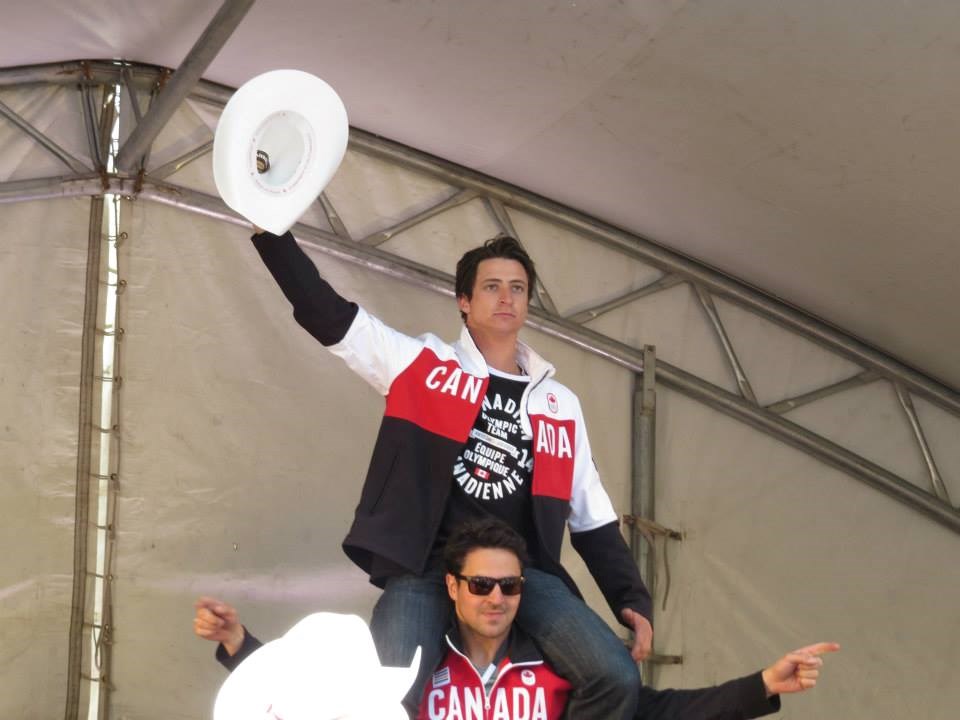When I was a teenager, I thought Olympians were essentially superhuman. To be fair, I thought that about a lot of pro athletes, but the sight of a Canadian on a podium at the world’s largest and (in my biased opinion, most awesome) sporting event always hit different. Super Bowls and Stanley Cups are great, but Olympic gold? That’s the ultimate prize.
It wasn’t just about the end results for me, though. Most Canadian Olympians I’ve watched or met seemed to be genuinely affable, down-to-Earth people. but their story-driven coverage of the Summer and Winter Olympics helped me discover my own passion for sports journalism.
I nearly died of happiness in 2014, when Team Canada visited my hometown of Calgary for a post-Olympic parade. There I got to meet many of my heroes, from ice dance icons Tessa Virtue and Scott Moir to Whistler’s own Marielle Thompson to Rosalind Groenewoud, the halfpipe skiing OG who—like myself—once attended Queen Elizabeth High School.
I spent much of my life idolizing athletes, as do many young boys and girls from coast to coast. It’s a practice that we, as a society, ought to reconsider.
Falling from grace
Don’t get me wrong: there are athletes out there worth rooting for. Some truly use their platforms to positively impact others. Yet time and again, a certain kind of headline enters into our collective consciousness: Famous Person X Caught Doing Objectionable Thing Y.
Take NBA star Ja Morant and NHL player William Karlsson as two relatively recent examples. Morant faces after openly brandishing a firearm in an Instagram Live video, apologizing for his behaviour, and then doing it again. Karlsson went viral for he delivered at the Vegas Golden Knights championship parade earlier this summer.
As of this writing, the Morant drama has yet to unfold completely, while Karlsson’s antics are hopefully a one-off. I’ve no interest in chronicling such drivel. My interest, however, is to remind us that fame and talent should not be the main criteria we consider when choosing our role models.
Morant is electrifying on the court, a two-time NBA All-Star with nearly 10 million Instagram followers. Many will give him a pass for his pattern of childish recklessness due in part to his highlight-reel dunks. Karlsson’s not a top-echelon NHL player and his social media following is accordingly more modest (104,000), but he’s gained plenty of notoriety for his intoxicated tirade.
This isn’t new—lots of heralded sportspeople have fallen from grace in various ways. O.J. Simpson is known more for his infamous murder trial than for his decorated NFL career. Ben Roethlisberger and Deshaun Watson have reprehensible sexual assault allegations in their pasts. Ime Udoka cheated on his fiancée with a member of the Boston Celtics staff while he coached the team. His 11-year-old son has to live with the consequences.
Celebrities outside of sport, from Amber Heard to Kevin Spacey and beyond, are equally capable of such shameful conduct.
Money and fame
I’m not directly comparing Morant and Karlsson’s actions to those of killers and sex offenders. Yet, what frustrates me is how fickle people can be in their response to incriminating news about celebrities. Some, like Heard and Simpson, lose much of their public standing, but others continue to be revered.
Most Pittsburgh Steelers fans love Roethlisberger. There are people who still think Watson is innocent, even though 24 women have filed sexual assault lawsuits against him. ESPN reporter Malika Andrews caught all sorts of social media flak for essentially holding Udoka accountable on live TV.
I can already hear the flood of misguided criticism coming, especially were I to post this article on a more… unfiltered platform like Reddit or Barstool Sports. In fact, a Barstool contributor known mononymously as wrote that: “[Karlsson] laid the foundation [for the Golden Knights’ Cup run], so now this man can do or say whatever the hell he wants for as long as he wants up on that stage.”
False. When people build up and profit off of their own public image, their conduct likewise becomes public. Their mistakes affect not only themselves and their immediate circles, but everyone whom they’ve impacted during their careers. High-profile athletes represent teams that pay them tens of millions of dollars a year, and they inevitably become the public faces of sports played by hundreds of millions.
It should go without saying that the actions of celebrities will and should be scrutinized more closely than those of laymen. With great power comes great responsibility.
Plus, Morant and Karlsson are both fathers. They should ask themselves whether or not they’d like their children to see them doing or saying “whatever the hell they want for as long as they want.”
At the same time, perhaps we should try to change the paradigm. Perhaps we should raise our kids and exhort our friends to admire those who deserve it, rather than those who happen to splash across our television screens and social media feeds. In the end, fame and talent are poor substitutes for integrity and character.




